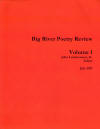Big River Poetry Review – 2013
Big River Poetry Review publishes lots of poems online—eight in January 2014 and nine in December 2013, for example—then gathers them all annually in this journal. This first volume covers the period between the review’s founding in late May 2012 through the end of the year. Based in Baton Rouge, LA and published in an unwieldy eight and a half by eleven format with a bright red cover, it includes 154 poems by almost as many authors. The magazine is open to a wide range of styles, subject matter, and skill levels, including poems that would benefit from being workshopped.
Big River Poetry Review publishes lots of poems online—eight in January 2014 and nine in December 2013, for example—then gathers them all annually in this journal. This first volume covers the period between the review’s founding in late May 2012 through the end of the year. Based in Baton Rouge, LA and published in an unwieldy eight and a half by eleven format with a bright red cover, it includes 154 poems by almost as many authors. The magazine is open to a wide range of styles, subject matter, and skill levels, including poems that would benefit from being workshopped.
That said, there is some good work here, including accomplished handling of rhyme and meter. Some poems are flawed but contain a great line or a great stanza, waiting to be built upon. Others cohere, get to where they need to go. Some are ambitious; for example, Martin Willitts Jr.’s six ekphrastic poems on Van Gogh. It’s too bad that they are scattered throughout the book instead of being grouped so they can be read as an ongoing project.
Other standout poems include Thomas Zimmerman’s “Pont du Gard,” a lean, angular sonnet, rhymed and metered. “The bridge is high above the river Gard,” it begins, “and we are in its plumbing.” I also liked Angie Harrison’s “Black Box,” an in-your-face presentation of the self that ends: “My back braces the wall. Three men / would suffer to move me. Lightning feeds / into my guts; I spark and speak.”
J.S. Absher’s “Commission” remembers the cockerels that adorned the hoods of the Dodges and Plymouths her father sold in the backyard: “. . . these ornaments stretch and crow / and the pale sun obeys, rising like smoke, / then catching fire on the green cusp of the sky.”
In her exuberant and edgy “New Orleans Roulette,” Lindsey Bellosa catches the spirit of the Big Easy:
You want something? Of course you do, we all do.
We want the moon, that queen in her wet jewel sky.
We open our mouths and our eyes: red and groping.
This city has so many things to put in them.
You might swallow the night or it might swallow you.
My award for the freshest language goes to Wanda Morrow Clevenger, whose long-lined Homeric narrative, “Return Unto Me the Self-Righteous Ones” tells the story of a feud, a hanging and a ghost that kills babies. It begins, “Come one Sunday in the early Appalachians, the Stanleys / shot up a church, dropped a Tilley preacher where he stood / and Tilleys where they’d cleaved bias and faith . . .”
It will be interesting to see where Big River Poetry Review goes from here. I hope it moves toward a format that is easier to hold in one’s hand and keep on a shelf, and that it attracts more work from its better poets and others like them.
[bigriverpoetry.com]





